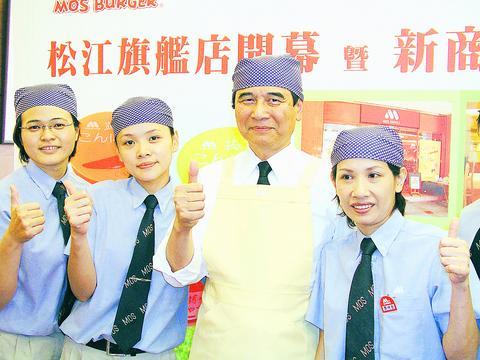Mos Burger Taiwan, a cooperative venture between Japan-based Mos Food Services Inc and Taiwan's Teco Electric & Machinery Co (
"We plan to have 66 Mos Burger outlets [in Taiwan] this year and to reach 100 stores next year," said Theodore Huang (
Well-known for rice burgers -- which sandwiches a patty of meat between two rice cakes -- Mos Burger currently runs 51 stores around Taiwan and reported NT$550 million in sales last year, of which rice burgers account for some 20 percent of total sales.

PHOTO: YANG YA-MIN, TAIPEI TIMES
With a personal enthusiasm for food, Huang introduced the Japanese brand to Taiwan in 1991 and formed an alliance in which Teco owns a 65 percent stake.
"Originally, I just tried to find some food suppliers for Teco's company cafeteria, then later I decided to officially introduce Mos Burger to Taiwan, since it is really nice," Huang said.
The company has allocated over NT$100 million for expansion plans and is targeting NT$700 million in sales this year, according to Amin Yuan (
One market watcher said the company's plan is on the right track, saying now may be a good time for expansion.
"With many landlords cutting rents in the wake of the SARS outbreak, the cost of setting up new stores is relatively low recently," said Shirley Huang (黃淑麗), secretary general of the Taiwan Chain Stores and Franchise Association.
In addition, since many money-losing restaurants were forced to shut down because of the impact of SARS, it is easier to find good locations, she said.
Rent accounts for 10 to 15 percent of each Mos Burger store's operational costs, Yuan said.
However, the market size for Mos Burger may be limited.
"The average prices of Mos Burger products are higher [than many other fast foods]," Shirley Huang said.
Therefore, Mos Burger stores can be sustained only in metropolitan areas where working people can afford their meals, she added.
More than 85 percent, or 44 out of the 51 stores Mos Burger currently has, are located in the Greater Taipei area. Some 70 percent of Mos Burger customers are female, drawn in by low-fat meals in a homey atmosphere.
But a slow economy and market saturation is undermining the local fast-food market.
"Over these two years, most chain stores have slowed down their expansion plans," Shirley Huang said.
Last November, McDonald's Taiwan closed 15 unprofitable stores and laid off 390 employees. The fast-food giant still has 349 stores in operation.
"Rather than increasing store numbers, this year we are focusing on upgrading customer brand loyalty," said Shalom Chen (
McDonald's is slated to launch a global campaign in next month to create a new brand image.
"This will be a very different move," Chen said.
McDonald's Taiwan reported NT$13 billion in sales in 2001, with last year's sales being described as flat.

SEEKING CLARITY: Washington should not adopt measures that create uncertainties for ‘existing semiconductor investments,’ TSMC said referring to its US$165 billion in the US Taiwan Semiconductor Manufacturing Co (TSMC, 台積電) told the US that any future tariffs on Taiwanese semiconductors could reduce demand for chips and derail its pledge to increase its investment in Arizona. “New import restrictions could jeopardize current US leadership in the competitive technology industry and create uncertainties for many committed semiconductor capital projects in the US, including TSMC Arizona’s significant investment plan in Phoenix,” the chipmaker wrote in a letter to the US Department of Commerce. TSMC issued the warning in response to a solicitation for comments by the department on a possible tariff on semiconductor imports by US President Donald Trump’s

‘FAILED EXPORT CONTROLS’: Jensen Huang said that Washington should maximize the speed of AI diffusion, because not doing so would give competitors an advantage Nvidia Corp cofounder and chief executive officer Jensen Huang (黃仁勳) yesterday criticized the US government’s restrictions on exports of artificial intelligence (AI) chips to China, saying that the policy was a failure and would only spur China to accelerate AI development. The export controls gave China the spirit, motivation and government support to accelerate AI development, Huang told reporters at the Computex trade show in Taipei. The competition in China is already intense, given its strong software capabilities, extensive technology ecosystems and work efficiency, he said. “All in all, the export controls were a failure. The facts would suggest it,” he said. “The US

The government has launched a three-pronged strategy to attract local and international talent, aiming to position Taiwan as a new global hub following Nvidia Corp’s announcement that it has chosen Taipei as the site of its Taiwan headquarters. Nvidia cofounder and CEO Jensen Huang (黃仁勳) on Monday last week announced during his keynote speech at the Computex trade show in Taipei that the Nvidia Constellation, the company’s planned Taiwan headquarters, would be located in the Beitou-Shilin Technology Park (北投士林科技園區) in Taipei. Huang’s decision to establish a base in Taiwan is “primarily due to Taiwan’s talent pool and its strength in the semiconductor

French President Emmanuel Macron has expressed gratitude to Hon Hai Precision Industry Co (鴻海精密) for its plan to invest approximately 250 million euros (US$278 million) in a joint venture in France focused on the semiconductor and space industries. On his official X account on Tuesday, Macron thanked Hon Hai, also known globally as Foxconn Technology Group (富士康科技集團), for its investment projects announced at Choose France, a flagship economic summit held on Monday to attract foreign investment. In the post, Macron included a GIF displaying the national flag of the Republic of China (Taiwan), as he did for other foreign investors, including China-based